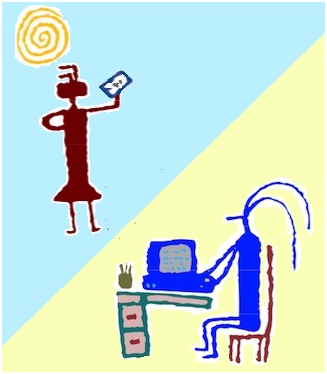
Most virtual volunteering assignments are text-based or designed-based: translating text from one language to another, transcribing podcasts, captioning videos, managing an online discussion group, designing a database, designing a graphic, and on and on. And one of the reasons I have really loved virtual volunteering is that, when it’s also limited to text-based communications with volunteers, potential volunteers can’t be judged regarding how they look or sound. Instead, volunteers in virtual volunteering, at least until recently, are judged by the quality of the character they show through their words and work. I don’t like to think of myself as prejudiced, but I have often wondered if I have been reluctant to involve a volunteer onsite because of unconscious bias on my part upon meeting a volunteer candidate face-to-face.
Virtual volunteering encounters in previous years have hidden the weight, ethnicity, hair color, age, accents, and other physical traits of online volunteers from the person onboarding that volunteer, and vice versa. But now, video conferencing is all the rage, and many programs are requiring that volunteer applicants participate in a live online meeting before they can volunteer online. As Susan Ellis and I note in our book, The Last Virtual Volunteering Guidebook:
Today’s preference to actually see and hear each other online is a double-edged sword: it can make electronic communication more personal and personable, but it can also inject offline prejudices evoked by how someone looks.
As a result of this rush to online video, are online volunteering candidates being turned away from programs because of possible but unacknowledged biases on the part of the manager of volunteers or whoever is initially screening applicants?
Are people that want to volunteer online hesitating to apply because they do not like how they look on video, don’t feel confident regarding their speaking voice or presentation skills, or are uncomfortable with welcoming someone “into” their home, even virtually?
Do people that would be interested in volunteering with you online on a text-based assignment decide not to apply because their Internet access isn’t fast enough for live video conferencing?
Are there people that would be interested in volunteering with you online that aren’t in your same time zone or who work or have home care duties that prevent them from being available at all the times you want to have a live video chat?
Think carefully before you make a meeting by video with potential volunteers mandatory. Is such a video meeting really necessary for the assignment the volunteer will do? Absolutely, certain tasks and roles require you to know if the volunteer is well-spoken, understands how to present themselves in a reputable, credible, clear manner, etc. But if it’s not required, per the role the volunteer is applying for, then consider how to balance your need for something personal with the volunteer’s desire for privacy. Consider how freeing it can be for a volunteer to be judged by the excellent web site they build for you rather than the physical disability people see immediately upon meeting them (not that people with disabilities EVER want to hide!). Consider how good it can feel for a person who is uncomfortable with his or her weight to be valued because of the excellent moderation skills and dynamic personality they show on your online community (again, not that any person, regardless of their weight, should EVER want to hide!).
For a lot more about screening and orienting online volunteers, as well as designing tasks, providing support for volunteers using online tools, evaluating virtual volunteering, designing an online mentoring program and much more, check out The Last Virtual Volunteering Guidebook, available for purchase as a traditional print book or as a digital book. The book is an oh-so-much-cheaper way to get intense consulting regarding every aspect virtual volunteering, including more high-impact digital engagement schemes, than to hire me. You will not find a more detailed guide anywhere for working with online volunteers and using the Internet to support and involve all volunteers. It’s available both as a traditional paperback and as an online book. I also think it would be a great resource for anyone doing research regarding virtual volunteering as well.
Also see:
- Screening Volunteers for Attitude
- Recruiting Volunteers To Serve in Difficult, Even Dangerous Roles
- Judgment & reputation online – and off
- Virtue & reputation in the developing world
- Why You SHOULD Separate Your Personal Life & Professional Life Online
- the scale of how we communicate online
- A warning re: Facebook privacy from Nicholas Thompson

If you have benefited from this blog or other parts of my web site and would like to support the time that went into researching information, developing material, preparing articles, updating pages, etc. (I receive no funding for this work), here is how you can help.


